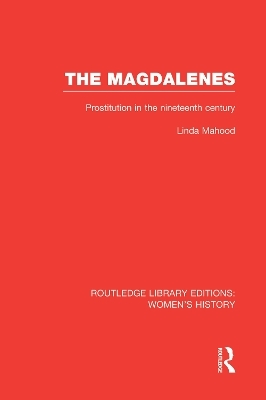
The Magdalenes
Prostitution in the Nineteenth Century
Seiten
2014
Routledge (Verlag)
978-0-415-75257-2 (ISBN)
Routledge (Verlag)
978-0-415-75257-2 (ISBN)
The nineteenth century witnessed a discursive explosion around the subject of sex; behaviour which had always been punishable began to be spoken of, regulated, and policed in new ways. This book traces and examines approaches emerging throughout the century towards prostitution and looks at the apparatus and institutions created for its control.
The nineteenth century witnessed a discursive explosion around the subject of sex. Historical evidence indicates that the sexual behaviour which had always been punishable began to be spoken of, regulated, and policed in new ways. Prostitutes were no longer dragged through the town, dunked in lakes, whipped and branded. Medieval forms of punishment shifted from the emphasis on punishing the body to punishing the mind.
Building on the work of Foucault, Walkowitz, and Mort, Linda Mahood traces and examines new approached emerging throughout the nineteenth century towards prostitution and looks at the apparatus and institutions created for its regulation and control. In particular, throughout the century, the bourgeoisie contributed regularly to the discourse on the prostitution problem, the debate focusing on the sexual and vocational behaviour of working class women. The thrust of the discourse, however, was not just repression or control but the moral reform – through religious training, moral education, and training in domestic service – of working class women.
With her emphasis on Scottish 'magdalene' homes and a case study of the system of police repression used in Glasgow, Linda Mahood has written the first book of its kind dealing with these issues in Scotland. At the same time the book sets nineteenth-century treatment of prostitutes in Scotland into the longer run of British attempts to control 'drabs and harlots', and contributes to the wider discussion of 'dangerous female sexuality' in a male-dominated society.
The nineteenth century witnessed a discursive explosion around the subject of sex. Historical evidence indicates that the sexual behaviour which had always been punishable began to be spoken of, regulated, and policed in new ways. Prostitutes were no longer dragged through the town, dunked in lakes, whipped and branded. Medieval forms of punishment shifted from the emphasis on punishing the body to punishing the mind.
Building on the work of Foucault, Walkowitz, and Mort, Linda Mahood traces and examines new approached emerging throughout the nineteenth century towards prostitution and looks at the apparatus and institutions created for its regulation and control. In particular, throughout the century, the bourgeoisie contributed regularly to the discourse on the prostitution problem, the debate focusing on the sexual and vocational behaviour of working class women. The thrust of the discourse, however, was not just repression or control but the moral reform – through religious training, moral education, and training in domestic service – of working class women.
With her emphasis on Scottish 'magdalene' homes and a case study of the system of police repression used in Glasgow, Linda Mahood has written the first book of its kind dealing with these issues in Scotland. At the same time the book sets nineteenth-century treatment of prostitutes in Scotland into the longer run of British attempts to control 'drabs and harlots', and contributes to the wider discussion of 'dangerous female sexuality' in a male-dominated society.
Introduction: The Deployment of 'Dangerous' Female Sexualities Part 1: The Birth of Social Medicine and the State 1. 'Harlots, Witches and Bar-maids': Prostitution, Disease, and the State, 1497 – 1800 2. A Medical Model of Immorality: The Glasgow Lock Hospital 3. Familiarity with the Illicit Part 2: Philanthropy, Piety, and the State 4. An Invitation to Discourse 5. The Domestication of 'Fallen' Women 6. Friendless, Fallen and Inebriate Women: The Transformations Part 3: The Glasgow System: Police Repression or Veiled Regulation? 7. Fighting the 'Multitudinous Amazonian Army' 8. Police Repression or Veiled Regulation? Conclusion: Prostitutes, Magdalenes, and Wayward Girls: Dangerous Sexualities of Working-class Women
| Erscheint lt. Verlag | 10.4.2014 |
|---|---|
| Reihe/Serie | Routledge Library Editions: Women's History |
| Verlagsort | London |
| Sprache | englisch |
| Maße | 156 x 234 mm |
| Gewicht | 317 g |
| Themenwelt | Schulbuch / Wörterbuch ► Lexikon / Chroniken |
| Geschichte ► Allgemeine Geschichte ► Neuzeit (bis 1918) | |
| Geschichte ► Teilgebiete der Geschichte ► Kulturgeschichte | |
| Geisteswissenschaften ► Psychologie ► Sexualität / Partnerschaft | |
| Sozialwissenschaften ► Soziologie ► Gender Studies | |
| ISBN-10 | 0-415-75257-4 / 0415752574 |
| ISBN-13 | 978-0-415-75257-2 / 9780415752572 |
| Zustand | Neuware |
| Haben Sie eine Frage zum Produkt? |
Mehr entdecken
aus dem Bereich
aus dem Bereich
Europa 1848/49 und der Kampf für eine neue Welt
Buch | Hardcover (2023)
DVA (Verlag)
CHF 67,20
Giordano Bruno - ein ketzerisches Leben
Buch | Hardcover (2024)
C.H.Beck (Verlag)
CHF 41,85


